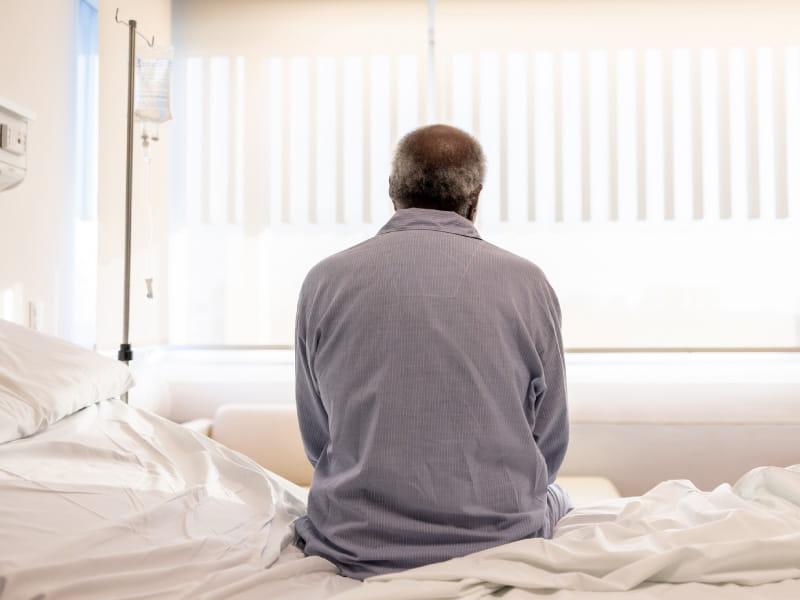Black veterans with PTSD may face a higher risk of rehospitalization after a stroke
美国心脏协会线上电子游戏飞禽走兽报道

Black veterans with post-traumatic stress disorder were more likely to be rehospitalized after a stroke than white veterans and Black veterans without PTSD, 一项新的研究发现.
The study, 哪一个审查了93个以上的数据,000年退伍军人, 该研究于周四发表在美国心脏协会期刊《中风.
Previous studies have shown that people with PTSD have a higher risk of heart disease and stroke and that they have strokes at younger ages than the general population. Studies also have shown that Black adults have a higher risk of rehospitalization after stroke. But this is one of the first studies to analyze how PTSD affects what happens after a stroke.
PTSD is a mental health disorder that affects people who have experienced a shocking, 恐怖或危险线上娱乐电子游戏网站. 它会导致强烈的焦虑, flashbacks or other symptoms when events or situations trigger memories of the original trauma.
“我们希望看到创伤后应激障碍在所有退伍军人中发挥作用, so we were surprised at the difference between African American and white veterans in both the impact of PTSD and other risk factors," Dr. 该研究的资深作者陈林在线上电子游戏飞禽走兽发布会上说.
使用退伍军人健康管理局的数据库, the researchers looked at what happened to veterans with PTSD after they had a stroke. "The main goal was to determine whether those with PTSD and stroke have different risks for stroke recurrence or hospital readmission and also to see whether race affected readmission rates," said Lin, a staff neurologist at the Birmingham Veterans Administration Medical Center and an associate professor of neurology at the University of Alabama at Birmingham.
The study used data from 93,651 veterans who had been hospitalized at any VA medical center in the U.S. 在1999年到2022年之间任何类型的首次中风. 他们的平均年龄略低于69岁. 在研究对象中,97%为男性,约22%为黑人,63%为白人. 研究人员对他们进行了平均五年的跟踪调查.
Nearly 17,000 stroke patients – about 18% of the veterans – were readmitted to a VA hospital for any cause. 几乎14%的中风患者被诊断患有PTSD.
在分析中, 研究人员研究了2型糖尿病等因素, 高血压, 高胆固醇和心脏外动脉狭窄. They also considered illicit drug or alcohol abuse, previous heart attack or a history of smoking.
Black veterans with PTSD were found to have a 10% greater risk of readmission compared to those without PTSD. White veterans with PTSD had a 5% greater risk of readmission than those without PTSD.
“对于那些患有创伤后应激障碍的人, there are worse outcomes in general among African American veterans than white veterans," Lin said.
Type 2 diabetes or illicit drug use were associated with a higher risk of rehospitalization after stroke among Black veterans, but the same risk factors were not associated with risk of rehospitalization for white veterans.
High cholesterol was significantly associated with higher risk of rehospitalization among white veterans, 但在黑人退伍军人中却不是这样.
高血压, a previous heart attack and narrowing of arteries outside of the heart increased the risk of post-stroke readmission in both Black and white veterans.
“在非裔美国人和白人人群中, there are important health conditions that can play a role in the risk of readmission after a stroke," Lin said. "Post-discharge care after stroke is always a challenge — people find it hard to get to the clinic, 特别是如果他们的残疾限制了他们的行走和驾驶能力. However, there is certainly a role for more targeted care focused on the modifiable risk factors, 例如2型糖尿病和非法药物使用."
The study's authors noted that their findings were limited by the information in the VA database. 研究结果也可能不适用于女性, 亚裔美国人或印第安人退伍军人, who made up a small percentage of the dataset of veterans with stroke in this study.
Lin said the findings "highlight the important things we can do to improve post-stroke care, 比如关注高危人群, 减少可改变的风险因素, achieving stricter Type 2 diabetes control and access for veterans who may need prescription medication treatment."





